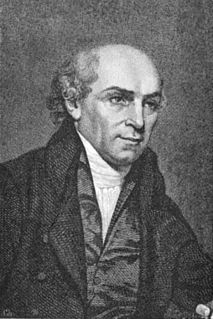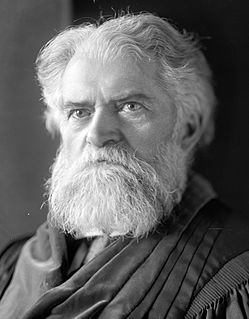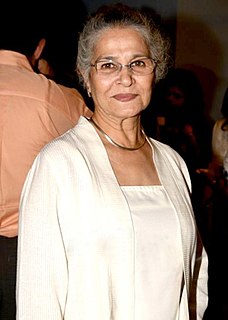A Quote by Charles Dickens
And what an example of the power of dress young Oliver Twist was! Wrapped in the blanket which had hitherto formed his only covering, he might have been the child of a nobleman or a beggar;—it would have been hard for the haughtiest stranger to have fixed his station in society. But now he was enveloped in the old calico robes, that had grown yellow in the same service; he was badged and ticketed, and fell into his place at once—a parish child—the orphan of a workhouse—the humble, half-starved drudge—to be cuffed and buffeted through the world, despised by all, and pitied by none.
Quote Topics
Been
Beggar
Blanket
Child
Covering
Despised
Dress
Example
Fell
Fixed
Formed
Grown
Had
Half
Hard
His
Hitherto
Humble
Might
Might Have Been
None
Now
Old
Oliver
Oliver Twist
Once
Only
Orphan
Parish
Place
Power
Robes
Same
Service
Society
Station
Stranger
Through
Twist
Which
World
Would
Wrapped
Yellow
Young
Related Quotes
He was about to go home, about to return to the place where he had had a family. It was in Godric’s Hollow that, but for Voldemort, he would have grown up and spent every school holiday. He could have invited friends to his house. . . . He might even have had brothers and sisters. . . . It would have been his mother who had made his seventeenth birthday cake. The life he had lost had hardly ever seemed so real to him as at this moment, when he knew he was about to see the place where it had been taken from him.
The weekend break had begun with the usual resentment and had continued with half-repressed ill humour. It was, of course, his fault. He had been more ready to hurt his wife's feelings and deprive his daughter than inconvenience a pub bar full of strangers. He wished there could be one memory of his dead child which wasn't tainted with guilt and regret.
The tree was so old, and stood there so alone, that his childish heart had been filled with compassion; if no one else on the farm gave it a thought, he would at least do his best to, even though he suspected that his child's words and child's deeds didn't make much difference. It had stood there before he was born, and would be standing there after he was dead, but perhaps, even so, it was pleased that he stroked its bark every time he passed, and sometimes, when he was sure he wasn't observed, even pressed his cheek against it.
But somewhere, a child surprises himself with his endurance, his quick mind, his dexterous hands. Somewhere a child accomplishes with ease that which usually takes great effort. And this child, who has been blind to his past, but his heart still beats for the thrill of the race, this child's soul awakens. And a new champion walks among us.
How few of us appreciate the fact that a very great deal of physical suffering in after life comes from bad mental training in childhood! I do not mean suffering of an imaginary kind; I mean disease which may entirely ruin a life which might have been of use to the world, and which surely would have been happier but for the lost health. Many a chronic invalid might have preserved his health had he been taught to use his brain properly when a child.
When Christ was about to leave the world, He made His will. His soul He committed to His father; His body He bequeathed to Joseph to be decently interred; His clothes fell to the soldiers; His mother He left to the care of John; but what should He leave to His poor disciples that had left all for Him? Silver and gold He had none; but He left them that which was infinitely better, His peace.
But say, my brothers, what can the child do that even the lion could not do? Why must the preying lion still become a child? The child is innocence and forgetting, a new beginning, a sacred 'Yes.' For the game of creation, my brothers, a sacred 'Yes' is needed: the spirit now wills his own will, and he who had been lost to the world now conquers his own world.
The great constructive energies of the child ... have hitherto been concealed beneath an accumulation of ideas concerning motherhood. We used to say it was the mother who formed the child; for it is she who teaches him to walk, talk, and so on. But none of this is really done by the mother. It is an achievement of the child. What the mother brings forth is the baby, but it is the baby who produces the man. Should the mother die, the baby still grows up and completes his work of making the man.
Atul had a child from his first marriage but lost him when he was just 16 years old. His wife died 7-8 years later. He's really had a tough life. Probably these experiences have made him a more sensitive, caring and loving person... Had we been 20 years younger, we definitely would have had children.
Step back in time; look closely at the child in the very arms of his mother; see the external world reflected for the first time in the yet unclear mirror of his understanding; study the first examples which strike his eyes; listen to the first words which arouse within him the slumbering power of thought; watch the first struggles which he has to undergo; only then will you comprehend the source of his prejudices, the habits, and the passions which are to rule his life. The entire man, so to speak, comes fully formed in the wrappings of his cradle.
Emile Saint-Blague had been a lively, versatile painter in his youth, but he had abused his energy by painting too many pictures; so that in what might have been the ripe period of his art he had nothing left but ideas. A man who has nothing left but ideas may be of great service to his friends, but he is of no use at all to himself. Emile was certainly an inspiration to his friends.






































